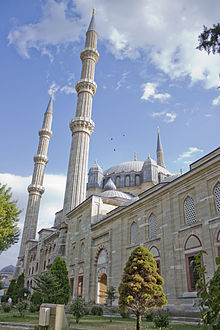Edirne Province
History
Edirne, capital of the province, is notable for serving as the third capital of the Ottoman Empire from 1363 to 1453.
Edirne province was included in the Second Inspectorate General which was created on the 19 February 1934 and extended over the provinces of Edirne, Çanakkale, Kırklareli, Tekirdağ. It was ruled by an Inspector General, who had wide-ranging authorities over civilian, military and educational matters. The office of the Inspectorate-General was abandoned in 1948 but the legal framework of the Inspectorate-Generals was only abolished in 1952, under the Government of the Democrat Party.
Until the reign of Selim I, there were remnant populations of so-called Tengri Turks in the province of Edirne who adhered to the ancient beliefs of Tengrism. It is assumed that it was a group of nomadic Yörüks.
Demographics

| Year | Pop. | ±% p.a. |
|---|---|---|
| 1927 | 150,840 | — |
| 1940 | 251,373 | +4.01% |
| 1950 | 221,268 | −1.27% |
| 1960 | 276,479 | +2.25% |
| 1970 | 316,425 | +1.36% |
| 1980 | 363,286 | +1.39% |
| 1990 | 404,599 | +1.08% |
| 2000 | 402,606 | −0.05% |
| 2010 | 390,428 | −0.31% |
| 2018 | 411,528 | +0.66% |
| source: | ||
Districts

Edirne province is divided into 9 districts (capital district in bold):
Gallery
-
Church of Saint John the Baptist in Uzunköprü.
-
Selimiye Mosque
See also
References
- ^ "Address-based population registration system (ADNKS) results dated 31 December 2022, Favorite Reports" (XLS). TÜİK. Retrieved 19 September 2023.
- ^ "İl ve İlçe Yüz ölçümleri". General Directorate of Mapping. Retrieved 19 September 2023.
- ^ Cagaptay, Soner (2006). Islam, Secularism, and Nationalism in Modern Turkey; Who is a Turk. Routledge. p. 47.
- ^ Pekesen, Berna (16 December 2019). Florian, Riedler; Kravietz, Birgit (eds.). The Heritage of Edirne in Ottoman and Turkish Times: Continuities, Disruptions and Reconnections. Walter de Gruyter GmbH & Co KG. pp. 423–424. ISBN 978-3-11-063908-7.
- ^ Bayir, Derya (2016-04-22). Minorities and Nationalism in Turkish Law. Routledge. p. 141. ISBN 978-1-317-09579-8.
- ^ Bozarslan, Hamit (2008-04-17). Fleet, Kate; Faroqhi, Suraiya; Kasaba, Reşat; Kunt, I. Metin (eds.). The Cambridge History of Turkey. Cambridge University Press. p. 343. ISBN 978-0-521-62096-3.
- ^ "Osmanlı'da Tengri İnancının Kalıntıları ve Kendi Kanını Akıtan Türkler". April 2020.
- ^ Genel Nüfus Sayımları
- ^ tuik
External links
- Edirne governor's official website (in Turkish)
- Edirne municipality's official website (in Turkish)
- Pictures of the capital of this province with its many great mosques
- Edirne Weather Forecast Information
41°07′12″N 26°31′14″E / 41.12000°N 26.52056°E



